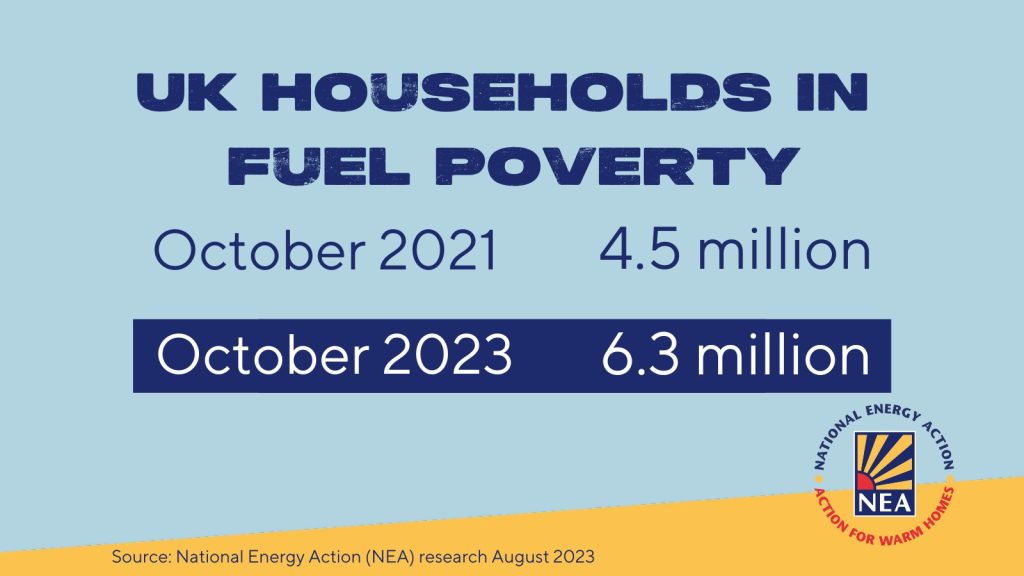Tomorrow (25 August), Ofgem will announce the new level of the energy price cap, for 1 October to 31 December. Based on the latest analysis by Cornwall Insight, the typical annual dual-fuel energy bill is expected to fall and be around £1,925. Following relentless record increases over successive winters, any reductions in energy bills will be welcome. However, we estimate 6.3 million UK households will still be trapped in fuel poverty, from 1 October when the new price cap levels take effect. That’s approximately 2 million more households living in fuel poverty, unable to heat and power their homes, than there were at the start of the energy crisis. The predicted average fall in unit rates may also be partially offset by some further increases to standing charges.
Rising energy debt deepens the challenge
Despite modest falls in ‘average bills’ and headline numbers of those worst affected, the UK remains mired in the energy crisis. We know from our own work and recent research by consumer group Which?, and analysis out today by Citizens Advice (CA) and Resolution Foundation (RF), too many households will still be full of dread about this coming autumn and winter.
Instead of getting better, CA and RF’s new analysis also suggests that the energy crisis might even be deepening for the poorest households. Thousands of households find themselves under an increasing mountain of energy debt since the UK Government, earlier this summer, withdrew almost all the additional support that was put in place last year to reduce energy bills. Millions more are still paying back debts from last winter when the Government were still subsidising practically everyone’s energy bills. This means, as well as paying bills on average more than £600 per year more expensive than they were prior to the crisis, many will also be paying back large debts at the same time.
We know that the pledged support to date is unlikely to be sufficient, as the cost of living continues to bite. The cost-of-living income payments that are being offered to households on benefits will help but are being eaten up by these energy debts or swallowed up by wider negative budgets. As well as not directly helping to offset bills, over one-third of low-income households that really need support are missing out on the payments all together, as they aren’t on mean-tested benefits.
Sadly, and despite the hugely damaging impact this can have on health and well-being, home heating is increasingly one of the main areas people look to cut back when their household budget is stretched. This means, if wider income supplements continue to be the only additional policy response, this is very unlikely to be an effective way of offsetting the negative ongoing impact, high bills have. So, without further targeted support, the consequences are likely to be just as bleak as the winter before. Not only will this badly affect both physical and mental health, it will also continue to damage the economy through reduced spending power and put further strain on small and large businesses.

Standing charges increases are unfair on many
Instead of hoping things will get better on their own accord, we hope the UK Government and Ofgem will continue to ask what more can be done to tackle the energy crisis. In terms of the price cap, we want Ofgem to reform standing charges, reduce the disproportionate costs those who pay by Standard Credit face and work with the Government to bring down energy debts.
Despite long-standing and increasing criticism of the impact standing charges have, particularly on low usage households, there has been no reform and a very significant increase in standing charges since the price cap was introduced. Much of this has been to pay for the cost of transferring the customers of failed energy suppliers to new suppliers, and as a conscious decision from Ofgem on how to pay for energy networks.
Low-income households often spend less on energy so a higher proportion of what they pay goes towards these inflated standing charges. Often these lower usage customers are on prepayment meters and must pay these charges in advance before they can access any energy in the home. As a charity, we have seen the terrible impact the current approach can have. Households who haven’t used any energy, particularly gas, for months, even years have racked up unmanageable standing charges which they are very likely to never be able to fully clear. It doesn’t have to be this way. We continue to highlight to Ofgem and the UK Government they could introduce a far more progressive approach. Either, by reflecting a customer’s usage when recovering these charges or have due consideration for people’s payment types or even incomes.
Standard credit customers also continue to face a raw deal, having to pay much more each year for their energy just because they pay by cheque or with cash. These are predominantly older households, that are more likely to be digitally excluded. Ofgem has the power to address this via the price cap and should adopt the same positive approach it has taken for prepayment customers, in removing the premium.
There is also growing consensus on the virtue of encouraging money matching repayment schemes within the energy sector. Money Advice Trust, NEA, Step Change Debt Charity, Scope and ten other organisations wrote to the Secretary of State for Energy Security and Net Zero earlier this year calling for a ‘Help To Repay’ repayment-matching scheme. This could be targeted at those households who really need support and not expose Government to a significant cost. The much-beleaguered Fuel Direct system and process of third-party deductions could be revamped for this purpose. By matching third party payments, debts would be cleared much more quickly. This would also partially address the anger many households feel from having older benefits, like Income Support Allowance or Job Seekers Allowance clawed back to pay for debts, without their consent.
Government and regulator have the means to do more
Beyond Ofgem making long overdue reforms to the retail market and supporting households to tackle a growing energy debt mountain, the UK Government needs to continue to take an active role in the energy crisis. Despite wider pressures on public expenditure, the UK Government has the resources and the mechanisms to offset the worst impacts of this winter and commit to deeper support next year. While billions were committed to offset the impact of last winter, much if it was badly targeted, often benefiting households who didn’t need help, while hundreds of millions of pounds that should have supported vulnerable households was underspent. Given the on-going challenges low-income and vulnerable customers will face, that unspent money should not be automatically handed back to the Treasury. It should be re-invested into directly reducing energy bills via targeted energy discounts or a more targeted Energy Price Guarantee this winter. Beyond energy specific support, the UK Government also has the option to provide further cost of living payments to households who would otherwise miss out on getting any help at all to cover the cost of essentials, including energy.
Beyond this winter, stubbornly high prices are very likely to be here to stay for the foreseeable future, prolonging the energy crisis. Cornwall Insight has also warned today that energy bills are not likely to revert to normal levels by the end of this decade. We and many other organisations want to see the UK Government meet its clear commitment in last year’s Autumn Statement to consult on a new Social Tariff or other options, including deeper energy discounts for vulnerable customers. This is not only a vitally important step in helping to make energy bills more affordable in the coming years. It is also fundamental in rebuilding trust in what has become a broken energy market, which is still distrusted by most customers. Finally, we need to create long-term ways to invest in energy efficiency and find more effective ways to regulate landlords so we can insulate millions of fuel poor homes by the end of this decade. This remains the best long-term way to reduce needlessly high energy bills, at the same time as meeting our commitments to net zero and the Government’s legal fuel poverty duties.
The obvious question is where is the money coming from to pay for it? Beyond using underspends from previous spending pledges to help more vulnerable households this winter, there is a huge amount of money being raised as result of the surge in energy prices. Love it or hate it, the Energy Profits Levy was put in place by then Chancellor, now Prime Minister, Rishi Sunak. It was extended by the new Chancellor shortly after he took office and is expected to raise £40 billion over the next six years. Just a fraction of this revenue, or others like carbon taxes or VAT on fuel bills would be more than enough to cover the costs of a new Social Tarriff, deeper energy discounts for vulnerable customers or ongoing investment in energy efficiency improvements. Just using this as general tax revenue to fund other priorities, would be deeply unfair and bake fuel poverty into the system over the reminder of this Parliament and beyond. In the coming weeks and months, we will see if the regulator or Government continues to have the appetite to tackle these issues head-on and the creativity to look beyond the usual mechanisms. If they don’t, the impacts will be felt for many years to come.



